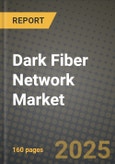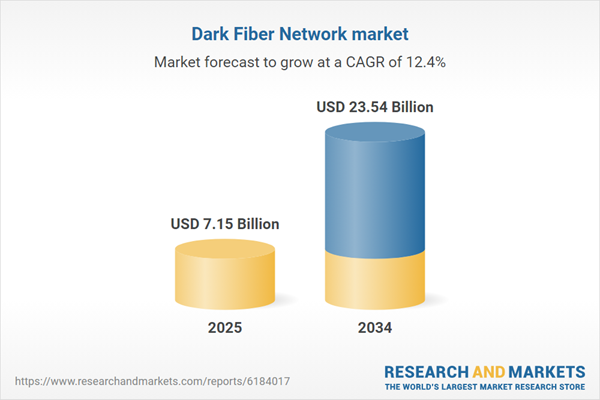Dark Fiber Network market
Dark fiber refers to unlit optical strands leased or owned for private lighting by carriers, hyperscalers, enterprises, governments, and neutral-host providers. Buyers light these strands with their own transceivers and DWDM systems, gaining dedicated capacity, security, and architectural control at predictable costs. Demand spans metro rings for data center interconnect (DCI), long-haul backbones for cloud and content delivery, 5G and small-cell fronthaul/backhaul, campus and smart-city networks, financial trading routes, media production transport, and regulated sectors seeking isolated connectivity. Trends include dense metro build-outs between multi-tenant data centers, redevelopment of legacy rights-of-way, hybrid deals that blend dark fiber with managed wavelengths, and open-access models that separate infrastructure from services. On the technology side, coherent optics, pluggable ZR/ZR+ modules, and ROADMs raise spectral efficiency and make customer-lit models simpler and cheaper to operate. Drivers are traffic growth from AI workloads, cloud repatriation/hybrid architectures, low-latency edge nodes, fiber-deep 5G densification, and the need to control total cost of transport over multiyear horizons. The competitive landscape spans incumbent and alternative fiber operators, tower and neutral-host players, utilities and railways with rights-of-way, and specialist dark-fiber wholesalers. Differentiation hinges on route diversity and latency, splice quality and attenuation, documentation and GIS accuracy, service-level commitments for maintenance windows and restoration, and commercial flexibility (IRU vs lease, indefeasible rights with expansion options). Emerging themes include pre-provisioned laterals into AI and HPC campuses, rural middle-mile programs, sustainability disclosures for build and operations, and digital twins of outside plant that cut truck rolls and accelerate route planning.Dark Fiber Network market Key Insights
- AI and DCI are the flywheel. Hyperscale and colocation campuses require east-west bandwidth and predictable latency; dark fiber lets operators scale wavelengths and upgrade optics without renegotiating services.
- Fronthaul/backhaul densification. 5G small cells and future 6G concepts push fiber to street furniture; dark fiber underpins scalable, vendor-agnostic transport for C-RAN and open RAN architectures.
- Control and security premium. Private lighting delivers deterministic performance, isolation from shared NMS domains, and sovereignty for regulated workloads, often surpassing managed service controls.
- IRU vs. lease strategies. Long-term IRUs fix route access and economics for critical paths; operating leases suit fast-changing footprints or projects awaiting demand proof.
- Route diversity is currency. Physically separated laterals, river and rail crossings, and alternative PoPs command premiums and satisfy dual-entry requirements at data centers and enterprise hubs.
- Pluggable coherent optics. ZR/ZR+ in routers and switches compress footprint and power, making DIY wavelength lighting viable beyond traditional DWDM shelves and lowering lifecycle cost.
- Documentation and OSP quality. Low attenuation, standardized splice cases, accurate as-builts, and GIS with strand-level inventory shorten turn-ups and speed restorations.
- Restoration philosophy matters. Mean-time-to-repair commitments, smart alarming, and pre-positioned spares differentiate providers on mission-critical routes.
- Open-access and neutral-host. Separation of passive plant from active services broadens wholesale addressable markets and attracts anchor tenants in metro and middle-mile builds.
- Sustainability and permits. Trenchless methods, shared ducts, and recycled reels reduce disruption and carbon intensity; proactive permitting and community engagement de-risk timelines.
Dark Fiber Network market Reginal Analysis
North America
Dense inter-data-center corridors anchor metro demand, with AI and cloud expansions adding campus laterals and low-latency rings. Middle-mile and rural programs extend routes beyond Tier-1 cities. Buyers prioritize dual-entry at DCs, diverse river crossings, documented splice loss, and strong restoration SLAs; IRUs are common on long-haul and critical metro paths.Europe
Cross-border corridors and carrier-neutral ecosystems support pan-regional dark fiber with strict route diversity and latency guarantees. Urban redevelopment enables micro-trenching and shared ducts. Financial hubs value ultra-low-latency routes; data sovereignty and open-access policies shape procurement. Sustainability reporting and street-works coordination influence awards.Asia-Pacific
Mega-cities and coastal corridors drive high-density metro builds; submarine landing stations and intra-island backbones create premium dark-fiber paths. Hyperscalers co-develop routes to new campuses and edge sites. Japan and Korea emphasize ultra-reliable metro rings; India and Southeast Asia see rapid fiber-to-tower and data-center interconnect growth with neutral-host partnerships.Middle East & Africa
National digital strategies and hyperscale entries spur long-haul corridors, metro rings, and data-center spines. Rights-of-way with utilities and transport lines accelerate deployment. Harsh environments elevate construction standards and proactive maintenance; open-access concessions and neutral-host models gain traction.South & Central America
Cloud region launches and content growth expand metro rings and long-haul diversity along coastal and trans-Andean routes. Permit risk and terrain drive interest in utility and rail corridors. Buyers value restoration commitments, transparent GIS inventories, and flexible lease-to-IRU pathways that align with currency and demand volatility.Dark Fiber Network market Segmentation
By Fiber Type
- Single Mode
- Multi-mode
By Type
- Metro
- Long-haul
By Material
- Glass
- Plastic
By Application
- Telecom
- Oil and Gas
- Military and Aerospace
- BFSI
- Medical
- Railway
- Others
Key Market players
Zayo, Lumen Technologies, Crown Castle, AT&T, Verizon, FiberLight, Windstream, Frontier Communications, Consolidated Communications, Colt Technology Services, euNetworks, Arelion (Telia Carrier), GlobalConnect, Orange, BT OpenreachDark Fiber Network Market Analytics
The report employs rigorous tools, including Porter’s Five Forces, value chain mapping, and scenario-based modelling, to assess supply-demand dynamics. Cross-sector influences from parent, derived, and substitute markets are evaluated to identify risks and opportunities. Trade and pricing analytics provide an up-to-date view of international flows, including leading exporters, importers, and regional price trends.Macroeconomic indicators, policy frameworks such as carbon pricing and energy security strategies, and evolving consumer behaviour are considered in forecasting scenarios. Recent deal flows, partnerships, and technology innovations are incorporated to assess their impact on future market performance.
Dark Fiber Network Market Competitive Intelligence
The competitive landscape is mapped through proprietary frameworks, profiling leading companies with details on business models, product portfolios, financial performance, and strategic initiatives. Key developments such as mergers & acquisitions, technology collaborations, investment inflows, and regional expansions are analyzed for their competitive impact. The report also identifies emerging players and innovative startups contributing to market disruption.Regional insights highlight the most promising investment destinations, regulatory landscapes, and evolving partnerships across energy and industrial corridors.
Countries Covered
- North America - Dark Fiber Network market data and outlook to 2034
- United States
- Canada
- Mexico
- Europe - Dark Fiber Network market data and outlook to 2034
- Germany
- United Kingdom
- France
- Italy
- Spain
- BeNeLux
- Russia
- Sweden
- Asia-Pacific - Dark Fiber Network market data and outlook to 2034
- China
- Japan
- India
- South Korea
- Australia
- Indonesia
- Malaysia
- Vietnam
- Middle East and Africa - Dark Fiber Network market data and outlook to 2034
- Saudi Arabia
- South Africa
- Iran
- UAE
- Egypt
- South and Central America - Dark Fiber Network market data and outlook to 2034
- Brazil
- Argentina
- Chile
- Peru
Research Methodology
This study combines primary inputs from industry experts across the Dark Fiber Network value chain with secondary data from associations, government publications, trade databases, and company disclosures. Proprietary modeling techniques, including data triangulation, statistical correlation, and scenario planning, are applied to deliver reliable market sizing and forecasting.Key Questions Addressed
- What is the current and forecast market size of the Dark Fiber Network industry at global, regional, and country levels?
- Which types, applications, and technologies present the highest growth potential?
- How are supply chains adapting to geopolitical and economic shocks?
- What role do policy frameworks, trade flows, and sustainability targets play in shaping demand?
- Who are the leading players, and how are their strategies evolving in the face of global uncertainty?
- Which regional “hotspots” and customer segments will outpace the market, and what go-to-market and partnership models best support entry and expansion?
- Where are the most investable opportunities - across technology roadmaps, sustainability-linked innovation, and M&A - and what is the best segment to invest over the next 3-5 years?
Your Key Takeaways from the Dark Fiber Network Market Report
- Global Dark Fiber Network market size and growth projections (CAGR), 2024-2034
- Impact of Russia-Ukraine, Israel-Palestine, and Hamas conflicts on Dark Fiber Network trade, costs, and supply chains
- Dark Fiber Network market size, share, and outlook across 5 regions and 27 countries, 2023-2034
- Dark Fiber Network market size, CAGR, and market share of key products, applications, and end-user verticals, 2023-2034
- Short- and long-term Dark Fiber Network market trends, drivers, restraints, and opportunities
- Porter’s Five Forces analysis, technological developments, and Dark Fiber Network supply chain analysis
- Dark Fiber Network trade analysis, Dark Fiber Network market price analysis, and Dark Fiber Network supply/demand dynamics
- Profiles of 5 leading companies - overview, key strategies, financials, and products
- Latest Dark Fiber Network market news and developments
Additional Support
With the purchase of this report, you will receive:- An updated PDF report and an MS Excel data workbook containing all market tables and figures for easy analysis.
- 7-day post-sale analyst support for clarifications and in-scope supplementary data, ensuring the deliverable aligns precisely with your requirements.
- Complimentary report update to incorporate the latest available data and the impact of recent market developments.
This product will be delivered within 1-3 business days.
Table of Contents
Companies Mentioned
- Zayo
- Lumen Technologies
- Crown Castle
- AT&T
- Verizon
- FiberLight
- Windstream
- Frontier Communications
- Consolidated Communications
- Colt Technology Services
- euNetworks
- Arelion (Telia Carrier)
- GlobalConnect
- Orange
- BT Openreach
Table Information
| Report Attribute | Details |
|---|---|
| No. of Pages | 160 |
| Published | November 2025 |
| Forecast Period | 2025 - 2034 |
| Estimated Market Value ( USD | $ 7.15 Billion |
| Forecasted Market Value ( USD | $ 23.54 Billion |
| Compound Annual Growth Rate | 12.4% |
| Regions Covered | Global |
| No. of Companies Mentioned | 15 |









